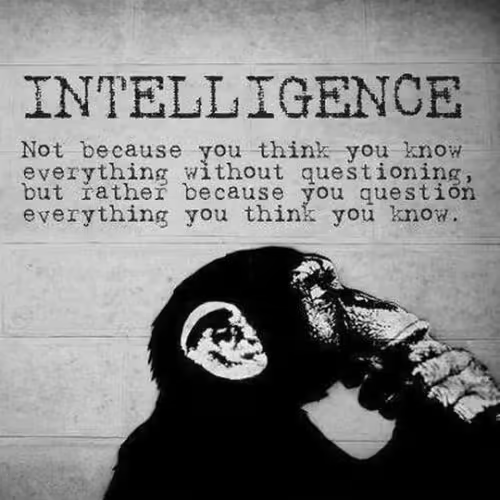Why Intelligence Is Feared. The Success of The Average
Societal Fear of Intelligence
It’s as if we’ve all collectively decided that as long as you say something with enough confidence, it doesn’t matter if it’s borderline nonsense.
Sadly, that left a stain on most of the society we are part of and changed the way we view intelligence.
Now, intelligence doesn’t just provoke admiration—it also sparks discomfort, even fear. Why?
The reason is straightforward: It challenges the comfortable boundaries that society we’re in rests upon.
Intelligence asks questions others might avoid, and it sees through the façades that most take for granted.
I’m sure you saw this scenario many times.
When someone too sharp walks into a room, there’s often a collective bristling, a silent recognition that this person might unsettle the status quo.
If you have seen that or was in this position before, you’re not alone.
We tend to navigate life by unspoken social contracts, relying on predictable behaviors, traditions, and shared beliefs.
And such beliefs are hard to remove.
Intelligence, however, isn’t content with mere compliance. It scrutinizes the “why” behind every “what.”
Now, the way I see it, society’s fear of intelligence naturally leads to a preference for simplicity and predictability.
Why?
Because simplicity is easy for us to manage, control, and sell.
Complexity, like intelligence, drives us to ask too many questions, creates too many variables, and unsettles the equilibrium.
In a world that craves stability, anyone of us who colors outside the lines becomes a threat, not an asset.
Mediocrity, on the other hand, fits perfectly into the mold that our society prizes.
It doesn’t challenge the system; it reinforces it.
Mediocrity thrives because it plays by the rules, rules designed to maintain order, not excellence.
The workplace, politics, education, even social circles, they’re often structured to reward those who follow the script, not those who rewrite it.
It’s no coincidence in my opinion that we see mediocre ideas and individuals rising to the top.
The reason is simple by now as you can tell – they offer the comfort of familiarity, the predictability that society craves.
Take the corporate world or where you work for instance.
The “yes-man” around you who follows orders is often favored over the thinker who questions the company’s direction.
Why? Because the yes-man doesn’t rock the boat. He maintains the status quo.
He’s a safe bet in a system designed to avoid risk, even if that risk could lead to innovation.
For us thinkers, we introduce uncertainty.
We challenge decisions, propose alternatives, and, in doing so, we threat the stability that mediocrity guarantees.
This is precisely what Schopenhauer understood: society isn’t structured to reward brilliance. It rewards compliance.
So as far as I can tell, mediocrity succeeds not because it’s better, but because it’s safer.
It’s predictable, and in our world that values stability over progress, predictability wins.
Simplicity offers the illusion of control and the comfort of familiarity for all of us even though it has terrible ramifications.
And in doing so, intelligence watches from the sidelines and growth passes by.
Intelligence as a Social Burden
I’m sure you’ve been in a situation where your intelligence was called out or frowned upon as if you just did a felony.
Generally, being highly intelligent is often viewed as a gift, but it can also be a social burden.
The more you see, the more you understand, the more you realize how out of sync you are with the world around you.
For many, our intelligence can lead to isolation, not because we choose it, but because society fails to understand us.
As Schopenhauer pointed out in his counsels and maxims, the more aware you are of life’s complexities, the more suffering you endure.
Take Nikola Tesla, for example.
His genius gave the world alternating current, wireless technology, and other groundbreaking innovations.
Yet, socially, he was an outsider.
While he saw a future filled with limitless possibilities, his peers either dismissed or misunderstood his vision.
Society wasn’t equipped to handle his intellectual brilliance, leaving him isolated.
In a way, Tesla’s struggles were indictive of the burden intelligent people carry.
I don’t know if you felt this like me before or not but let me ask you something:
Have you felt that due to how aware you’re you feel the weight of the world more acutely?
Its like we notice the contradictions, the hypocrisy, the unfairness embedded in societal structures easily.
Where others find comfort in simple answers, the intelligent of us are left grappling with deeper truths.
This self-awareness leads to existential frustration.
We see the flaws in systems, but trying to explain these to others often leaves us ostracized.
I’m sure you know what I mean.
People dislike feeling inferior or having their beliefs questioned.
And an intelligent person, even without intending to, challenges these beliefs just by existing.
The result? Social isolation, and sometimes resentment projected towards us.
On the flip side, less intelligent people often find success not by seeing more, but by seeing less.
In other words, aligning themselves with the collective expectations of society.
This is where adaptability and social cohesion come into play.
Intelligence doesn’t always lead to success.
It’s not enough to be smart—you need to be adaptable and socially attuned.
Take politics as a prime example.
Politicians rarely rise to the top purely on the basis of intellect alone.
Instead, they succeed by being socially astute, reading the room, and giving people what they want to hear.
Mediocre leaders are often liked because they reflect society’s desires, even if those desires are misguided.
Let’s ruffle up some feathers to make it stick.
In my view, appealing to a narrative and charisma are two of the main reasons why some less smart people get the throne.
Consider the success of someone like George W. Bush.
By no means he was an intellectual giant by all standards.
But, he managed to resonate with a wide swath of American voters by presenting himself as a relatable everyman figure.
He aligned himself with what people wanted, a simple narrative in complex times.
Most people around us don’t want their illusions shattered; they want them reinforced.
And those of us who play along, who blend in with society’s expectations, tend to succeed.
Now here’s another example that took the world by storm you probably heard of before.
Think about the rise of tech entrepreneurs and public figures like Elizabeth Holmes, the founder of Theranos.
She convinced some of the world’s top investors, politicians, and business leaders that she was a a genius set to revolutionize the medical industry.
But what was driving her success? Not groundbreaking intellect thats for sure.
Its charisma.
In my eyes, her ability to tell a compelling story, project unshakeable confidence, and look the part of a tech visionary fooled us all.
This reminds me of a business quote I read a while back: products sell because they tell a story, not because they solve a problem.
It wasn’t until the cracks in her empire began to show that people realized her intelligence had been deeply overestimated.
Holmes’ case isn’t an isolated incident.
Our society is often enamored by those who exude confidence, mistaking it for intellect.
This phenomenon is rooted in our perception.
We are naturally drawn to those who project certainty and command attention.
I’m sure you’ve seen this play out in your life.
In boardrooms, political arenas and our circle of friends, those who can speak persuasively are often seen as the smartest person in the room.
This leaves no room for us questioning their actual knowledge or depth.
In a way, this creates a culture where style overshadows substance.
Intelligence, on the other hand, can become a burden when it distances you from the social structures that determine success.
Schopenhauer recognized this:
intelligence, by revealing life’s complexities, alienates its possessor.
And if you think about it, it actually makes sense.
Intelligence, by its nature, questions and explores as you know.
It doesn’t claim to have all the answers.
As a result, we can appear hesitant or unsure, qualities that society doesn’t typically associate with “genius.”
As a result, our society tends to mistakenly assume that quick and confident presence represent deep thinking.
It creates a society where the loudest voices, not the most intelligent of us, shape decision-making and public opinion.
This means that intelligence, in these spaces, becomes secondary to the ability to perform.
In other words, it’s not what you know, but how you look and sound while saying it have been the driving force.
What does that leave us with? a skewed hierarchy where perception, not intellect, reigns supreme among us.
A culture thats lead, fooled and guided by loud, ignorant and rude figures that play on our insecurities and position themselves as the sound of change and reason.
However, a silver lining has finally emerged after years of tolerating this nonsense.
The rise of rationality, the emergence of truth-seeking intellectuals and thinkers who are acting as agents of change and rebellion.
Its this new wave of rationale and reason that not only brought more criticism to old ways of thinking, but to questioning the unquestionable.
To be fine disturbing and even reshaping the narrative.
To me, thats a win all day long.
But how is this trend manifesting? What movements are emerging as a result of this rational awakening?
Thats a topic for the near future.
I’ll let you ponder on this post for now.
Thanks for reading this post!
Im curious, have you had an experience where the wrong person was in the right place?
Comment down below!
Until then, stay free.




